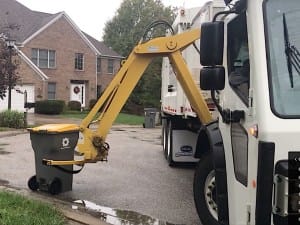Bin there done that: Bloomington council OKs garbage fees retroactively, preps for report

At its regular Wednesday meeting, Bloomington’s city council ratified garbage collection fees that expired nearly a year ago, on Nov. 1, 2020.

In the future, the council won’t have to worry about fees expiring. That’s because on Wednesday, the council eliminated the city code’s entire “sunset” clause for the fees.
The sunset clause was added as an amendment, when the council adopted the 2017 ordinance that set the fees for the new system of refuse carts.
The clause was intended to trigger a review of rates, after sufficient data had been collected by public works staff from the new system.
Wednesday’s action did not raise garbage collection rates.
Based on March 22, 2017 meeting minutes, the council was supposed to undertake a rate review last year with an eye towards possibly providing a rebate to residents who generate less garbage.
Based on the meeting minutes, it appears that the debate on the exact date of the sunset clause lasted about an hour. The initial date proposed was July 1, 2019, but public works director Adam Wason said if there were to be a sunset date, he’d prefer Nov. 1, 2020. Wason said the later date would allow more data to be collected.
On Wednesday, the ordinance passed by the city council was approved at the same meeting on the same day when it was first introduced, which required and received a unanimous vote.
Under state law, the council is able to ratify the authorization of the fees retroactively, according to assistant city attorney Larry Allen.
City council president Jim Sims said the public works department is scheduled on Oct. 20 to deliver the report that the department would have given last year. That seemed to help head off extensive council discussion of solid waste issues, which came up during the council’s hearings on the public works departmental budget.
The 2017 ordinance lists three cart sizes, each with a monthly price range.
(i) 35 gallon solid waste cart fee range: $4.82–$6.51.
(ii) 64 gallon solid waste cart fee range: $8.60–$11.61.
(iii) 96 gallon solid waste cart fee range: $13.72–$18.52.
The current price for each cart is at the top end of the range.
During budget hearings at the end of August, some councilmembers indicated an interest in adopting a “pay-as-you-throw” component for the fee structure. The idea would be to give a rebate of some kind to residents who set out their carts less frequently than every week. The thought is that it might incentivize residents to generate less waste.
During the budget hearings, director of public works Adam Wason said he is not now pursuing that kind of pay-as-you-throw approach—because the city has not heard requests for it, and there is a high level of satisfaction with garbage collection, based on the most recent community survey.
Wason said, “I have had zero residents contact us in the last year…requesting pay-as-you-throw.” He added, “If you look at the community survey, it’s one of the city services that’s actually rated at…I think it was 85 percent satisfaction with residents this past year.”
At Wednesday’s meeting councilmember Matt Flaherty noted the similarities between the discussion among councilmembers at budget hearings this year and the discussion reflected in the March 22, 2017 meeting minutes.
Flaherty said he wants to look at the problem of trash and recycling carts blocking sidewalks, because it’s an accessibility issue. He said, “I’ll just note that we have some pretty serious issues with that actually, with trash and recycling bins obstructing sidewalks all over the city. I see it constantly.”
Flaherty also said he is looking to eliminate the inequity that stems from the $1.5-million general fund subsidy to sanitation services.
Residential buildings with four or fewer units, including single-family houses, are provided garbage collection services. But owners of larger buildings have to contract with their own waste haulers. That means residents of multifamily buildings wind up paying taxes for services they don’t get.
Flaherty put it this way: “I live in a condo. I pay for my trash service. Part of my tax dollars also pay for your trash service, if you live in a four-unit home or less.” He added, “I think that, too, is sort of fundamentally inequitable, and something we should move away from.”




Comments ()